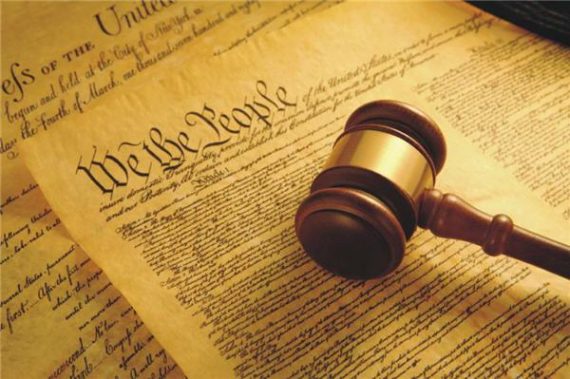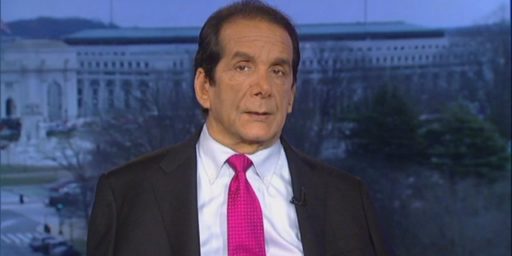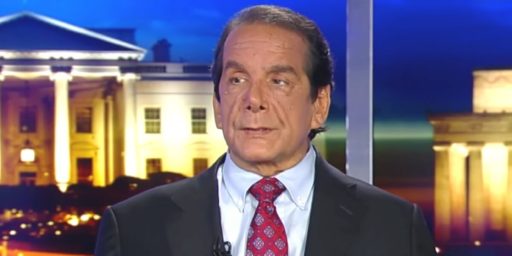The Unconstitutional Constitution
While the Constitutionality of the War Powers Act is indeed dubious, the fact that it was passed over Nixon's veto isn't the reason.
Charles Krauthammer declares, “No president should accept — and no president from Nixon on has accepted — the constitutionality of the WPR, passed unilaterally by Congress over a presidential veto.”
While the Constitutionality of the War Powers Act is indeed dubious, the fact that it was passed over Nixon’s veto isn’t the reason. The Framers put the override power in Article I for a reason, after all. Having to achieve a supermajority in both Houses of Congress is a high hurdle, making the veto power quite a strong tool–one that’s used with shocking rarity. But for a president to have the unilateral power to kill any legislation he disliked without Congressional recourse would upend the careful set of checks and balances built into the system.
Krauthammer’s argument is of a piece with those who argue that some Constitutional amendments are unconstitutional because they conflict with the document envisioned by the Framers, totally missing the point of the amendment process.







And what’s up with putting political question in neener-neener quotes?
Not everyone needs to go to law school. But anyone who wants to claim to know something should, um, know something.
I think the the WPA is clearly within the Constitutional authority of Congress and McCarthy is missing the point.
Congress, and only Congress, has the authority to take the country to war. The President has command of the armed forces but he has no war making power whatsoever.
In addition to granting the war power to Congress, Article I, Section 8 includes the power “to make all laws which shall be necessary and proper for carrying into execution the foregoing powers…”
With the WPA Congress provided the statutory authority for the President to repel an attack when there is no time to petition Congress for a declaration of war (or authorization for the use of military force) but then to defer to Congressional authority regarding war making power once the crisis is past.
Regarding ending military action, Congress doesn’t need to pass a separate law and present it to the President for his approval to exercise power granted to it in the Constitution.
In war the President’s role is that of a military commander. In America the military defers to civilian authority. Under the Constitution the civilian authority is Congress. To say that Congress can’t stop the President in war is aking to saying that Truman couldn’t stop Patton marching on Moscow in 1945.
@Steve P: No, that’s not quite right. Patton was subordinate to Truman; the president and the Congress are co-equal powers in separate branches of government.
Edwin Corwin correctly notes that the separation of powers created an “invitation to struggle for the privilege of directing American foreign policy.” Presidents have long exercised their power as commander-in-chief to deploy troops into harm’s way. This goes back to at least Thomas Jefferson and the Barbary pirates.
The Supreme Court has held, in INS v. Chadha, the legislative veto unconstitutional. Even though almost all executive agency power is a delegation from Congress, the Court ruled that Congess can’t unilaterally intervene in its exercise by passing laws that bypass the president. The War Powers Act’s chief enforcement mechanism is a legislative veto.
Look…partisan republican hacks like krauthammer really only care what the constitution, or the framers, or anything else means if it agrees with them. For instance Bachmann loves her some states rights until NY passes marriage equality in which case she wants a constitutional amendment more in line with her own homophobia. They don’t want activist judges unless they are activists for what they want. The list goes on and on and on. Small government unless it’s about sticking their nose in peoples bedrooms. Free markets unless it’s throwing money at farmers and oil companies.
Elect a republican president and krauthammers view will change 180 degrees. That’s all you need to know.
James,you still read Krauthammer? You have my sympathies.
Well, if anyone’s an expert on partisan hacks, it’d be Hey Norm…
I took Krauthammer’s statement differently — not rejecting the origins of the act, but emphasizing that no president has ever acknowledged its legitimacy — to the point where Nixon vetoed it and forced Congress to pass a veto override.
Not a single president has acknowledged the legitimacy of the Act, but have dodged the question by going along with it — while saying that they are NOT doing it because they are compelled to. Clinton, arguably, violated it, but not until Obama has any president just up and ignored it.
Now the ball’s in Congress’ court. What will they do about Obama’s flouting of the law?
My bet says probably nothing.
J.